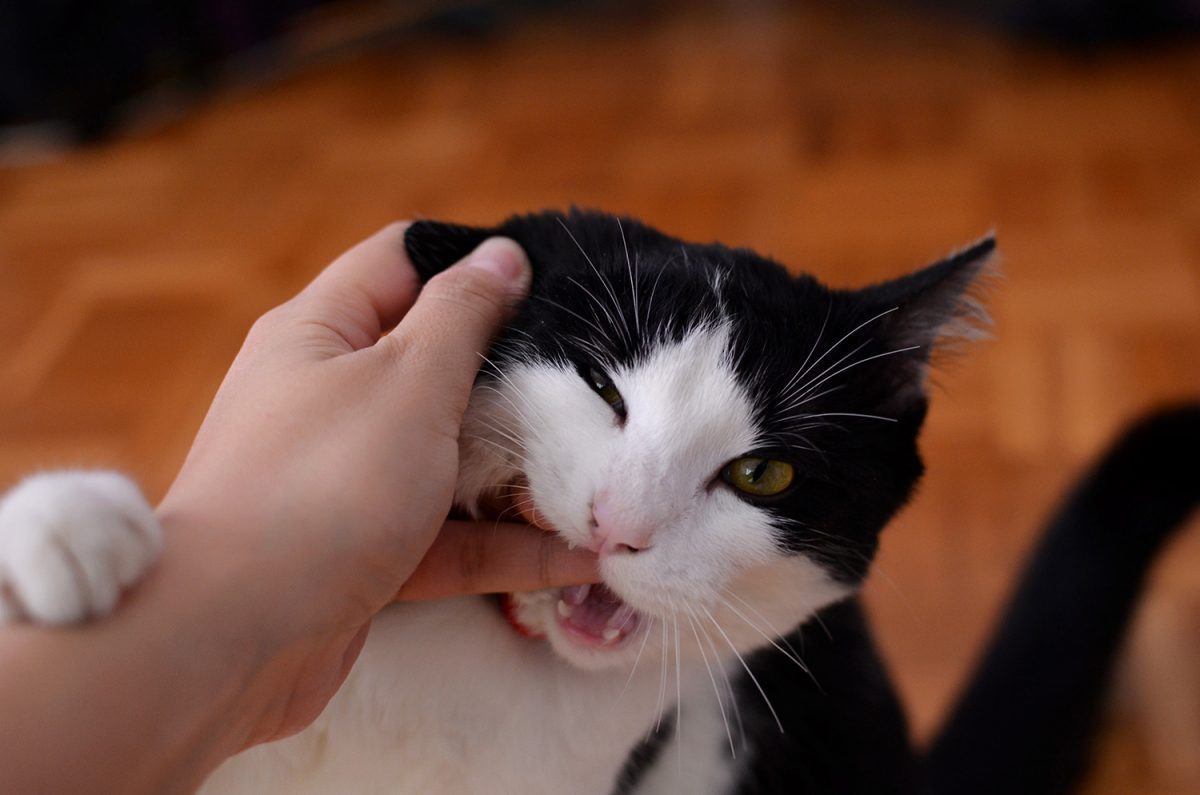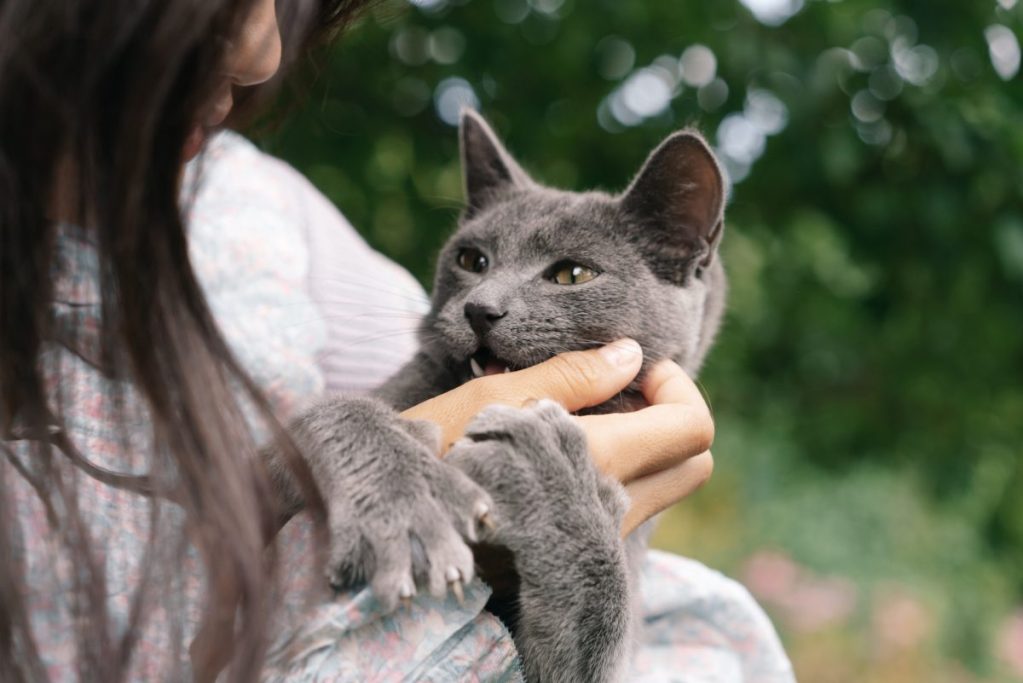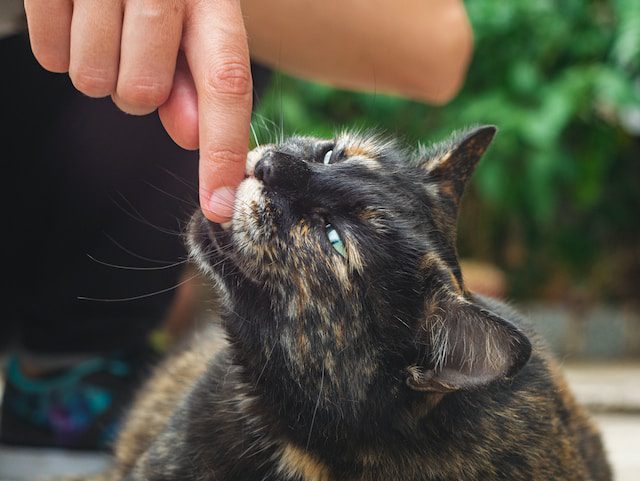
Why Do Cats Bite?
5 Apr 2021.
As cute, furry and cuddly as cats are, they are also predators with suitably sharp teeth. Most kitty owners will, at some point, experience an unpleasant bite from their furry friend. But why do cats bite, and what can we do to stop it? Cat in a Flat finds out.
Table of contents
Why does my cat bite me?
There are several types of cat bites that kitty owners will come across. Although none are pleasant, there is a big difference between a playful nibble and an aggressive chomp. So what are the different kinds of bite?
What is play biting?
Cats’ play naturally involves their predatory instincts. Whether roughhousing with another cat or chasing a piece of string, some biting often occurs during kitty playtime. For cat owners, this can mean that their hand or foot suddenly becomes the subject of pouncing and biting, especially if Mr Whiskers gets a bit carried away.
Biting during play is particularly common in kittens who learn to explore their abilities and instincts by play hunting. Play biting isn’t usually unpleasant or aggressive, and cat owners shouldn’t try to change this behaviour unless it becomes a real problem. Frequent playtimes help keep our kitties stimulated, active and happy, and helps reduce your cat preying on wildlife.
Try to discourage your cat from using your hands and feet as play things from an early age, however. Playful bites from kittens can become a lot more painful as they grow older.

Why does my cat bite me when we have just been cuddling?
It might seem odd that Mr Whiskers will go from a purring ball of fluff to a sharp-toothed little monster in seconds. When a cat bites you when being petted, this is often your cat telling you that cuddle time is over. Too much petting and touching can lead to overstimulation in kitties, and their way to communicate that it’s all getting a bit too much is a (usually) gentle bite.
Cat owners know their kitty better than anyone, and it’s essential to get to know what Mr Whiskers likes and doesn’t like. Touching certain areas of your cat’s body can make them feel uncomfortable and can result in a warning bite. Every cat lover knows that the belly can be a particularly sensitive area. Even if your cat shows you their fluffy tummy, it isn’t always an invitation to touch it. Other areas can be too sensitive for Mr Whiskers. Monitor your cat’s body language when petting them and leave them alone if you notice signs of irritation or aggression. If their tail starts to twitch or wag, they stop purring and seem tense, then give your kitty some space.
If your cat is injured, they might bite if being touched is painful to them. A cat in pain will often hiss, howl, growl and try and get away from you and hide. If you think your cat might be injured, talk to your vet immediately.
Other cats will bite as a sign of affection when they are with someone they like, such as their owner or another kitty. Affectionate bites are a lot more common in cats who have had kittens and may mimic the action of mummy cat cleaning and grooming her litter. These shouldn’t be painful, but if your cat is a little too enthusiastic or sharp-toothed and the bite hurts, gently move them away.
For more tips on understanding cats’ body language, read Cat in a Flat’s article on how to tell if your cat is happy or unhappy.

What about aggressive cat biting?
An aggressive bite is one when your cat is trying to inflict pain. These bites will usually come if Mr Whiskers is scared or defensive. Hissing, spitting, growling, an arched back, puffed-out fur and backwards-pointing ears are good signs your cat is angry, frightened, or both.
Aggressive bites from a cat can be dangerous. Despite being small, cat bites can pack quite a punch. Your kitty’s mouth is also full of bacteria, so cat bites can quickly become infected. Try and avoid touching or going near your cat if they become aggressive. Removing yourself from the situation and leaving your kitty to calm down is usually the best course of action. If a cat bites you and the skin is punctured, clean the wound and seek medical advice.
If your cat becomes repeatedly aggressive, an animal behaviourist can help you to manage their behaviour. As a first step, ask your vet for advice.
Important: If your cat bites you, don’t punish them; they won’t know why you’re doing it, and it could lead to more negative behaviours.

Why does my cat knead me?
Another kitty behaviour that can unintentionally hurt cat owners is kneading. Otherwise known as “making biscuits”, kneading is the rhythmic stretching and pushing of their paws. This behaviour is a sign of comfort, contentment and affection.
Kneading starts early in kittens – they will knead their mother’s stomach to stimulate milk production when feeding. Cats associate kneading positively with this primitive stage of their development and with the idea of being comforted and nourished. In adult cats, this association continues with their new guardian – you.
Cats also have scent glands on the pads of their paws, so kneading can also be a way of marking something with their scent – including their favourite person! Often a cat will knead and purr at the same time when being stroked or settling down for a nap. Cats will also knead soft surfaces such as blankets or their owner’s lap. Much like purring, cats will also knead to self-soothe.
As a cat stretches its paws, it will naturally unsheath its claws and dig them into whatever surface it is kneading. Unfortunately for cat owners, the claws can often end up going into their lap.
Again, it’s crucial not to punish your cat. Your kitty is showing affection, not trying to hurt you! If kneading gets too painful, try placing an extra layer between you and their paws, such as a blanket. If it is still too much, gently move your cat to a soft surface they can knead.

How can I teach my cat not to bite?
Get your cat to stop biting by modifying its behaviour in the following ways.
- Never play with your cat using a bare hand – or any body part! You don’t want them to associate hunting or play with your body; it will be a difficult connection to break. Even if play biting is cute as a kitten, an adult cat can inflict a lot more harm.
- Play regularly with your cat. Activating the predator instinct through healthy play with toys should help prevent unwanted bites at other times. Play keeps Mr Whiskers happy and healthy.
- If your cat bites you while holding your hand and kicks or scratches at the same time, try not to pull your hand away. This action encourages a predatory response: to your kitty, it feels like prey trying to escape. It’s better to keep still until your cat relaxes or gently push towards Mr Whiskers to get them to release you.
- Distract your cat with a toy and try and direct their aggression towards something safe if they bite you.
- You can also indicate playtime has gone too far by making noise and moving away from them, similar to how another cat would behave.
- Reward good behaviour, such as playing with toys or interacting with you gently, with your time, attention, and the occasional treat.
- Never punish your cat: they won’t understand what’s happening, and it risks making aggressive behaviours worse.
- If your cat is aggressive, remove yourself from the situation and wait for Mr Whiskers to calm down.
- If aggressive behaviours continue, talk to your vet and consider working with an animal behaviourist to help your kitty stay calm.
Learn more about cat body language, facial expressions, vocalisations and what their tail can tell you on the Cat in a Flat blog.
Top tip for owners: When booking a cat sitter, remember to brief them on anything that can cause your kitty to scratch or bite – including their petting preferences.
Top tip for cat sitters: When meeting a kitty client for the first time, be polite and introduce yourself by letting them sniff your hand. A cat will want to get to know your scent before letting you stroke them. A good start will help keep your interactions cordial – and hopefully affectionate – from then on.
- aggressive cat
- cat behaviour
- cat bite
- cat biting
- Cat Care
